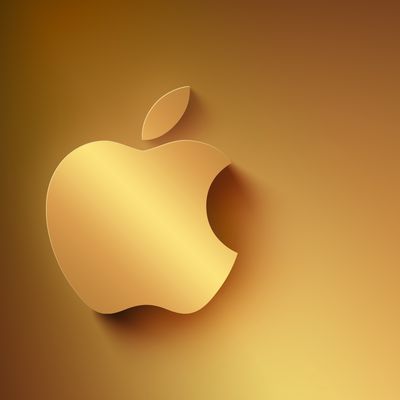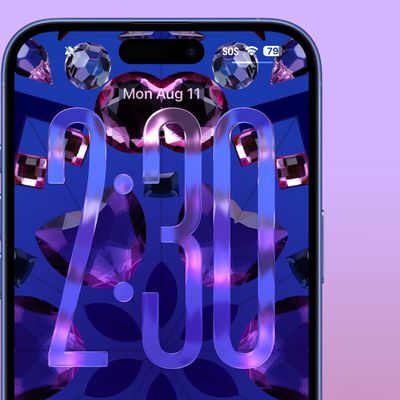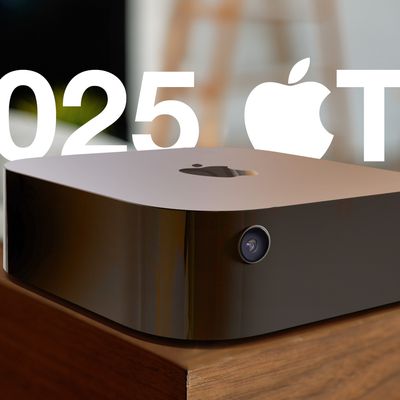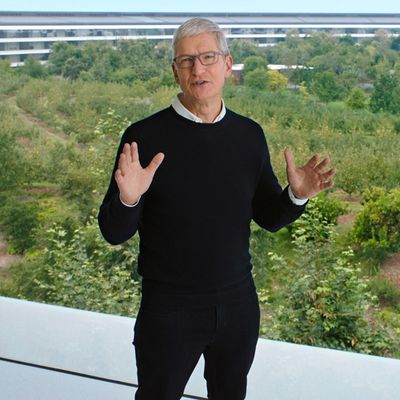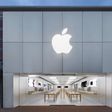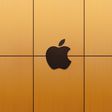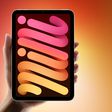OS X Mountain Lion Limits Apps to Mac App Store, Signed Apps by Default
One of the significant new features in OS X Mountain Lion is Gatekeeper, a new security system to help keep users from installing nefarious applications on their machines.
The new system relies not only on Mac App Store distribution as means of vetting apps, but also on a new "identified developer" program under which developers distributing their applications outside of the Mac App Store can register with Apple and receive a personalized certificate they can use to sign their applications. Apple can then use that system to track developers and disable their certificates if malicious activity is detected.
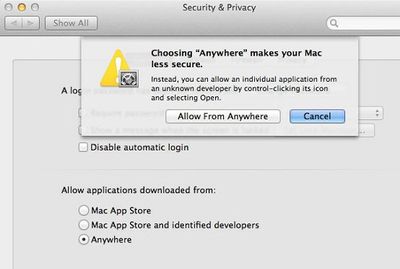
As Macworld notes in its review of Gatekeeper, OS X Mountain Lion's default setting will be to only allow initial launching of apps either downloaded from the Mac App Store or which are digitally signed under Apple's identified developer program. Users will be able to access Gatekeeper's settings in the Security & Privacy section of System Preferences, where they will also be able to choose from an even stricter setting that will allow for installation of Mac App Store apps only or a looser setting that will allow all applications to be installed and launched.
Located in the General tab of the Security & Privacy preference pane is a setting called “Allow applications downloaded from,” with three options:
Anywhere: This choice uses the same set of rules as every previous version of Mac OS X. If an app isn’t known malware and you approve it, it opens.
Mac App Store: When this choice is selected, any apps not downloaded from the Mac App Store will be rejected when you try to launch them.
Mac App Store and identified developers: This is the new default setting in Mountain Lion. In addition to Mac App Store apps, it also allows any third-party apps that have been signed by an identified developer to run.
For users on the default setting, they can bypass the initial Gatekeeper check the first time they launch an unsigned third-party app by right clicking on the app itself and choosing the "Open" command. Once the application has been opened one time, Gatekeeper no longer has any control over it.
As for apps that are signed by an identified developer, Macworld notes that OS X Mountain Lion will perform a daily check with Apple's servers for blacklisted developer signatures, and if an app from a blacklisted developer is installed on the user's system it will not open.
Importantly, Apple's identified developer program does not involve any sort of vetting on Apple's part, as certificates are automatically issued upon request and can be freely used by the developers. But what the program does do is provide a way for Apple to link specific developers to specific apps and use Gatekeeper to revoke application functionality should a developer be discovered to be distributing malware.
Popular Stories
Apple's upcoming iPhone 17 Pro will have a starting price that is $50 more than the iPhone 16 Pro but it will come with a minimum 256GB of storage, doubling the base capacity compared to last year's model. The information comes from Chinese leaker Instant Digital, posting on Weibo. The account, which has 1.5 million followers, has now made the claim three separate times in recent weeks....
Apple made a major slip Wednesday when it accidentally included hardware identifiers in software code linking to numerous unannounced products.
The leaked information provided MacRumors with concrete evidence of Apple's hardware development across multiple product categories. Here's everything that was confirmed through the code discoveries:
New HomePod mini with updated chip – New...
Apple is continuing to tweak the way that the Liquid Glass design looks ahead of the iOS 26 launch, and the latest beta makes a change to the Lock Screen.
The Lock Screen clock has been updated with additional transparency, allowing more of the background to peek through.
Beta 6 on left, beta 5 on right
The clock also has more of a 3D, floating look, which is in line with the rest of the ...
It is now mid-August, meaning that Apple's annual iPhone event is just around the corner.
This year, Apple is expected to unveil the iPhone 17, the all-new iPhone 17 Air, the iPhone 17 Pro, and the iPhone 17 Pro Max.
Here are some of the key rumors for those devices:iPhone 17: Same design as iPhone 16, but with an A19 chip, a larger 6.3-inch display, an upgraded 24-megapixel front camera, ...
We're just about a month away from Apple's annual September event, and we're going to get a new version of the Apple Watch Ultra for the first time since 2023. There are some useful new features rumored for the Apple Watch Ultra 3, which we've summarized below.
Subscribe to the MacRumors YouTube channel for more videos.
Satellite Connectivity - The Apple Watch Ultra 3 will be the first...
An alleged iPhone 17 Pro production leak may provide a first look at the device's milled all-aluminum chassis, which this year includes the camera bump – in contrast to last year's iPhone 16 Pro model that features a glass camera module attached to an all-glass back panel.
Originally shared by leaker Majin Bu, the image below could be of a moulding, but it still lines up with rumors that...
Rumors suggest that Apple is working on an updated version of the Apple TV that's slated for launch later this year. Information about the upcoming device that was found in Apple code indicates that it will be equipped with the A17 Pro chip.
There have been multiple rumors about a new Apple TV coming in 2025 with a new A-series processor, but it hasn't been clear which chip Apple would use...
While the summer months are often relatively quiet for Apple, the company still has many new products coming later this year.
Below, we have outlined at least 10 new Apple products that are expected to launch later this year, along with key rumored features for each.
This article was originally published last month, and it has been updated with the latest rumors.
iPhone 17 Series
iPhon...




